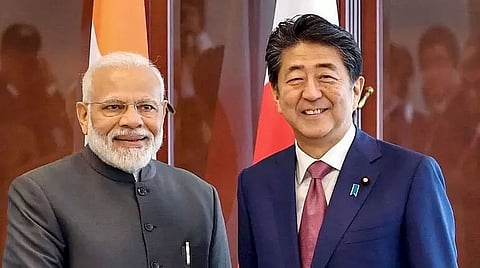
- Home
- Live Blog
- Breaking News
- Top Headlines
- Cities
- NE News
- Sentinel Media
- Sports
- Education
- Jobs

Siddharth Roy
(siddharth01.roy@gmail.com)
In 1893, when Swami Vivekananda was on his way to attend the World Conference of Religions, he visited Japan. After a few years in an interview, he said that the Japanese people are patriotic and artistic, and moreover the greatness of Japan lies with its people. He also said that by emulating Japan's political and social morality, India can also achieve such greatness. Subhash Chandra Bose and Rabindranath Tagore were also inspired by Japan's integrity and patriotism. After 11 decades when Shinzo Abe became the Prime Minister of Japan he quoted Swami Vivekananda's Chicago speech and said that India's contribution to the world has always been its spirit of tolerance. He was trying to carry the legacy of his grandfather and former Japanese PM Nobusuke Kishi. That's why when he was assassinated on 8th July, there was large-scale mourning in India as India lost its special world leader and well-wisher. Shinzo Abe was a pivotal figure in the improving Indo-Japan relationship. For him, ties with India weren't only bilateral relations but to build a strong foundation in the Indo-Pacific region. He was the longest-serving PM of Japan and the only Japanese leader to visit India 3 times. Not only did he give a new direction to the Indo-Japan ties, but he also became a close ally and friend to our Prime Minister. His love for India was immense and in his book "Towards a Beautiful Country: My Vision for Japan" he wrote that in the next decade Japan-India relationship can become stronger and more important than Japan-US and Japan-China ties. With his death, this vision of improving the Indo-Japan relationship has taken a setback. On 9th July, the Indian Government declared National Mourning day as a tribute to India's friend Shinzo Abe.
Shinzo Abe wasn't any ordinary politician but a leader who nurtured the vision of making Japan an economic and geopolitical power. Japan's defence and security were of special importance to him and hence wanted to revise the pacifist constitution of Japan. Due to his long tenure as the PM of Japan, he could convert many of his ideas into actions. Shinzo Abe was the mastermind behind the conceptualization of the Indo-Pacific and also the notion of building a strong infrastructure to tackle China's belt and road initiative. In his vision for Asian solidarity and taking Japan to new heights, he made India its strong ally. His grandfather and former PM of Japan, Nobusuke Kishi was the first PM of Japan to visit independent India in 1957 and had offered an Official Development Assistance (ODA) to India after Independence which India accepted with open arms. For Shinzo Abe, visiting India was the topmost priority in his foreign policy initiatives. He encouraged the idea of "The confluence of two seas" in relation to the broader Indo-Pacific concept which is an important part of India's foreign policy too. Forming the Quad with Australia, the USA and India was a dream for Abe which became a reality. Under Abe's leadership, India and Japan signed a civil nuclear pact to improve engagements on defence and economic levels.
When it comes to economics, there is a term called Abenomics which was a distinctive term coined by Shinzo Abe. What is Abenomics? Japan was going through a slow growth period even though it was a developed economy. In Abe's second tenure as PM, his main goal was to revive Japan's stagnated economy. Hence he devised a 3-step strategy including monetary easing, government spending and economic reforms for Japan's growth which came to be popularly known as Abenomics. This helped Japan defeat the persistent deflation going on for years. Through this hyper-easy monetary policy and fiscal spending he stimulated economic growth during Abe's tenure, India attracted maximum Japanese investments – 10% of the Foreign Direct Investments in India came from Japan. Japanese investments in India reached new heights in 2017 reaching $4.2 billion. Japan's cutting-edge technology is a boon for India. As a matter of fact, in 2017, Shinzo Abe came to India to inaugurate India's bullet train project. The Japanese Government backed Japan International Cooperation Agency (JICA) made huge investments in India. According to their sources, average commitments were around 348 billion Japanese Yen and average disbursements were around 216 billion Japanese Yen. Pre-pandemic trade with Japan was also fruitful in which $4.86 billion of exports and $12.77 billion of imports were involved. Today Japan is India's ninth largest investor and all the credit goes to Shinzo Abe and his commitments to a better Indo-Japan relationship.
In defence cooperation, it was Abe who brought India and Japan close on security matters. During the last days of Abe's tenure, major defence agreements on military cooperation were signed between New Delhi and Tokyo to ensure a mutual exchange of supplies and services. Under this agreement, India and Japan can access each other's military bases. To counter China, he wanted to exorcise Japan's Collective Self-Defense Right for which the Amendment of the Pacifist Constitution of Japan remained a priority for him. He advocated a united Indo-Pacific region to counter Chinese attempts to establish Chinese hegemony over this region.
Bilateral ties with India became the strongest under Shinzo Abe's regime. Japan supported India in the Development of North-east India, the Formation of the Quad and also the Asia-Africa growth corridor made to tackle the One Belt One Road initiative of China. Japan always stood strong with India during Indo-China border disputes. Indo-Japan Relations reached new heights in the Special Strategic and Global Partnership which is a significant contribution under his tenure. Abe always advocated the unity of Asian democracies against belligerent powers like China. Nurturing rich ties through Historical, Cultural, Economic and Strategic Exchanges would be a proper tribute to Shinzo Abe.